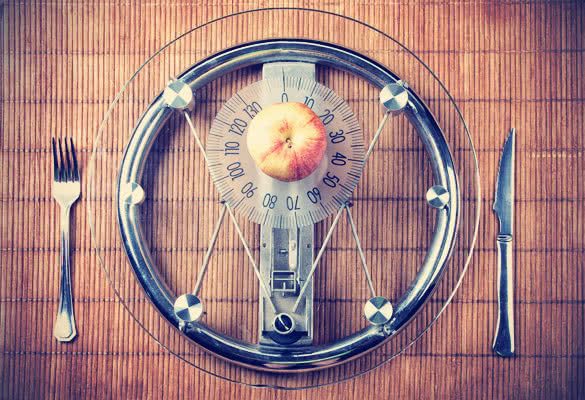Although it is not easy, it is certainly not impossible. There are many steps you can take and numerous tricks you can use that will help you control your appetite and put an end to this destructive addiction once and for all.
1. Stop Dieting – Diets can Make Your Overeating Habits Much Worse
Following a strict diet and denying yourself food when you are hungry can lead to dangerous cravings, which may cause you to overindulge in food.
Diets that promise fast weight loss, as well as imbalanced nutritional choices will not fix your overeating habits. The most important key to prevent overeating is to consume moderate portions of healthy food throughout the day.
2. Became Aware of Why You are Overeating
Understanding the reason for your overeating is the first step towards a healthier life.
Are you under stress? Do you feel unhappy about your life? Are you going through a particularly difficult time at the moment?
Stress, depression, loneliness, anxiety, sadness, anger, and other negative psychological conditions can lead to emotional eating, which can easily turn into food addiction.
You should therefore pay great attention to what is going on inside of you when you overindulge in food. Relying on food to fill the inner emptiness and suppress negative emotions will only give you temporary satisfaction. To really stop overeating, you must understand the root cause of your problems and learn to deal with your emotions without using food.
Yoga, mediation, deep breathing, and other relaxation techniques can considerably reduce the amount of stress in your daily life, as well as help you gain control over your emotional and physical health.
If however you think that you can not handle your problems alone, you should consider talking to a professional.
3. Avoid Eating When You are Bored
Eating when you are bored is a bad habit. If it’s constant, you should fight it by making your life richer, more meaningful and more interesting.
Instead of eating when you don’t know what else to do at the moment, distract yourself. Call a friend, go out for a walk, do some exercises, or keep yourself busy with anything else that you like doing. After a while, you will probably find out that you weren’t actually hungry at all.
4. Eat Only When You are Really Hungry and Stop Eating When You Feel Full
Learn to listen to your body. Being able to distinguish between emotional and physical hunger is one of the keys to avoid overeating. Consuming food when your body doesn’t need it will only make you gain weight. Always give your emotional craving a little time to pass and eat only when you feel truly hungry.
You should also learn to stop eating when you start feeling full and satisfied. Remember that after you have finished eating, it takes about 20 minutes for your stomach to send a signal to your brain that you are perfectly full. So, before taking another portion, give yourself some time to digest.
5. Eat Slowly and Chew Your Food More
Chewing your food more will slow down your eating and allow you to absorb more nutrients from the food.
Eating slowly will give your stomach time to tell your brain that it has had enough food. This will help you avoid overeating and give you the chance to really appreciate and taste your meal.
6. Drink Plenty of Water
Drinking plenty of water throughout the day, and especially before meals, will curb your hunger and make you feel fuller.
Many people also mistake dehydration with hunger. When they are thirsty, they think they are hungry, and they try to quench their thirst with food. To avoid this, drink at least 8 glasses of water a day.
7. Use Smaller Plates and Arrange Your Food Nicely
If you use a smaller plate, you can fill it up. It will look more visually satisfying than a larger, half filled plate. This will trick your brain into thinking that the food portion is large enough to satisfy your hunger.
You should also pay attention at how you present your meal. If you arrange it nicely, you will enjoy it more and eat less.
8. Savor the First Bites and Chew Them Slowly
It has been proven that after the first few bites our taste buds start to lose their sensitivity to substances that give food its flavor.
By savoring and eating slowly the first bites of your meal, you will satisfy your craving for flavor and avoid eating too much.
9. Do not Deny Yourself Foods that You Crave
If you do it, you will only want them more. This will make you crash and overindulge in these foods later.
Every now and then, allow yourself a treat and enjoy a small serving of your favorite pizza.
10. Do not Bring the Whole Pot to the Table
Prepare your plate in the kitchen and do not bring the whole pot to the table. You will thus avoid the temptation to continuously refill your plate. This is a good way to avoid overeating.
11. Stop Eating in Front of the Television
Eating while watching TV, working at your computer, or reading the newspaper can be disastrous. When you are distracted, you don’t realize how much food you are ingesting and you tend to overeat.
You should focus on your meal and always eat at your dining table. If you pay attention to what you are eating, you are more likely to stop when you start feeling full.
12. Learn to Appreciate and Enjoy Your Food
Apart from satisfying hunger, eating is supposed to be an enjoyable experience. You must learn to savor every single bite of your meal and give it your full attention. The more you focus on the aromas and flavors of your food, the less you will eat.
13. Clear Your Kitchen of Foods that Will Cause You to Overeat
Figure out what foods make you overeat and don’t buy them any more. If you are addicted to snacks or dressings, rid your fridge and cupboards of these foods and replace them with healthier alternatives. You are much more likely to overeat when your kitchen is full of tempting foods.
When you go grocery shopping, fill your cart with healthy and nutritious products and avoid junk food. And remember to never go to a grocery store on an empty stomach, as this will make you buy a lot of unnecessary foods.
14. Choose Satisfying Foods that Satiate Your Hunger
Satisfying foods are those that have the ability to provide nutrition and satisfy hunger with fewer calories. They can make you feel full faster and for a longer period of time.
Choose foods with high water content, as well as those rich in fiber and protein, and avoid foods like nuts, crackers, chips, chocolate candies, candy bars, and white bread. In other words, eliminate fat, sugar and refined carbohydrates. These foods will leave you unsatisfied and force you to eat more later in the day.
1. High-water content foods such as leafy greens, melons, and tomatoes can help suppress hunger and give you a longer-lasting feeling of fullness. They are low in calories, but high in volume and they can fill up your stomach very quickly.
2. Fiber rich foods will also make you feel full faster and for longer. They absorb water and swell up in the stomach, which slows down the digestive process giving you a longer lasting feeling of satiety. Adding fiber to your diet will therefore help you lose weight and avoid overeating.
3. If you want to prevent overeating, you should also incorporate more high-protein foods into your diet. Protein is slowly absorbed by the body and it stays longer in your stomach. This can make you feel less hungry and keep your food cravings at bay.
15. Get Enough Sleep
Lack of sleep can lower levels of leptin, a hormone that tells us when we are full. When leptine levels are low, you can not realize when you have eaten enough.
Insufficient sleep will also increase ghrelin, a hormone that stimulates appetite and makes you eat larger amounts of food.
Try to get at least 8 hours of sleep each night and you will eat less.
16. Eat a Healthy and Rich Breakfast Every Morning
People who eat a rich breakfast are less likely to overeat at their next meal.
Including some healthy fats, protein, fiber, and complex carbohydrates in your morning meal will allow you to feel fuller and more satisfied for a longer period of time and stay energized throughout the day.
Skipping breakfast will set you up for extreme hunger and food cravings later in the day.
Whole-grain cereal, fruits, flaxseeds, eggs, peanut butter, avocado, and yogurt are some good breakfast options to start your day in a healthy way. Aim for a minimum of 300 calories, as less than this will make you overeat at lunch.
17. Eat 5 Small Meals a Day
This means eating every 3 hours. Frequent eating will curb your hunger and keep your blood sugar and energy on a stable level. This will keep your body from going into starvation mode and prevent you from overeating in between meals.
18. Don’t Let Setbacks and Guilt Discourage You
Overeating is a tricky game. The more you eat, the more you want. The more cookies you consume, the more you crave them. Once you’ve arrived to 10 cookies, you think: “What’s the point of stopping now? The damage is already done. Why not go and buy some more yummy foods at the grocery store?” That is how it goes. Isn’t it?
The feeling of guilt that follows overeating will probably discourage you and make you give up trying to stop this destructive addiction. Well, don’t let guilt beat you down and prevent you from leading a happy and healthy life!
If you have overeaten today, don’t do it tomorrow. Plan instead to go running, brisk walking, or biking. If you have messed up, it doesn’t mean it’s the end of the world. Just stick to your plan tomorrow and you’ll repair the damage you’ve done.
However, you must challenge yourself to become a stronger person. You need to strengthen your will and learn to push away food every time you’re tempted to overindulge. It is not easy and it takes time, but you can certainly do it.
If you think that you are not able to deal with your emotional states by yourself, you should consider doing some relaxation techniques or talking to a professional. This will help you overcome feelings of guilt, discouragement, and hopelessness, and give you strength to go on. You might not be perfect, but if you are determined enough and willing to change, you will reach your goals.
If you like this post, please don’t forget to share it with other people who need help and suggestions on how to stop overeating. Thanks!
















Add Comment